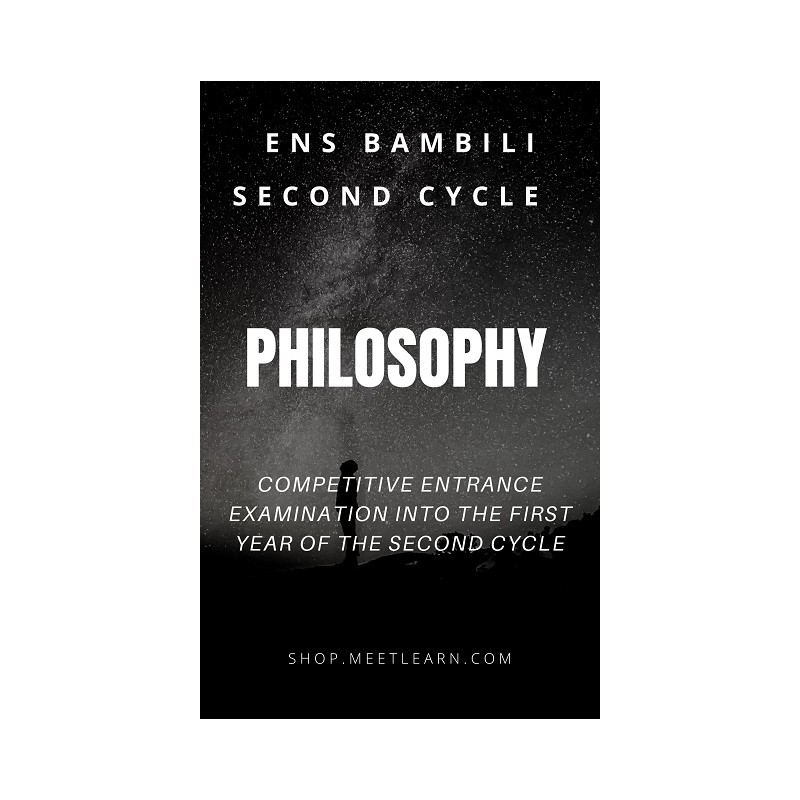- -₦664.42



COMPETITIVE ENTRANCE EXAMINATION INTO THE FIRST YEAR OF THE SECOND CYCLE OF ENS BAMBILI - PHILOSOPHY
DEPARTMENT: PHILOSOPHY
DURATION: 4 HOURS
SECTION 1: MAJOR PAPER: PHILOSOPHY
SECTION 2: MINOR PAPER: AFRICAN SOCIAL THOUGTH
SECTION 3: GENERAL KNOWLEDGE AND BILINGUALISM
SECTION 4: STRUCTURED ESSAY QUESTIONS
Featuring Years:
Philosophy 2014/2015
Philosophy 2015/2016
Philosophy 2016/2017
Philosophy 2017/2018 etc.
Number of Pages: 46
Note: This Book is a PDF File and so is available online only. Once your Payment is made, you will receive an automatic download link into your email address.
 Security policy (edit with Customer reassurance module)
Security policy (edit with Customer reassurance module)
 Delivery policy (edit with Customer reassurance module)
Delivery policy (edit with Customer reassurance module)
 Return policy (edit with Customer reassurance module)
Return policy (edit with Customer reassurance module)
COMPETITIVE ENTRANCE EXAMINATION INTO THE FIRST YEAR OF THE SECOND CYCLE FOR 2017/2018
DEPARTMENT: PHILOSOPHY
DURATION: 4 HOURS
NSTRUCTIONS: Answer all questions! Select the correct answer to each of the questions in Section One, Two and Three, and write the corresponding letter (A, B, C or D) in the Answer Booklet provided. Section Four comprises two structured essay.
Make sure that you insert the question paper inside the Answer Booklet before you leave the examination hall!
SECTION ONE (40%)
1. Who is a philosopher in the original sense of the word?
A) Someone who studies the stars and planets.
B) A person primarily interested in the truth about moral matters.
C) A lover and pursuer of wisdom, regardless of the subject matter.
D) A clever and tricky arguer.
2. Which philosophical tradition includes existentialism and phenomenology?
A) Analytic philosophy B) Rationalism C) Continental philosophy D) Pragmatism.
3. Which of the following is a common myth about philosophy?
A) Philosophical questions are hard to answer, and the answers often give rise to further philosophical questions.
B) B) Reading philosophy in a way that makes it understandable can be hard work.
C) Philosophy deals with important and fundamental questions left unanswered by more specialized disciplines
D) Philosophical questions are simply semantic disputes in which no one opinion is any better or worse than another is.
4. Existentialism is the philosophical doctrine according to which our being as subjective individuals is more important than:
A) What we have in common objectively with other human beings.
B) Our objective relationship with God. C) Our ability to exercise individual choices.
D) Our choice of inner beliefs.
5. The fact that the world seems to have a purposive order serves as a premise in the:
A) Ontological Argument. B) Cosmological Argument.
D) Argument from Design. D) Argument from First Cause.
6. According to Hume, no claim can be proven to be true unless:
A) The denial of the claim entails a contradiction. B) We can conceive it clearly in our minds. A) It's a clear and distinct proposition. D) There is evidence eliminating all other possibilities.
7. According to Leibniz's "Best of All Possible Worlds" response to the problem of evil:
A) God is not benevolent. B) There is no evil in the world. C) God is not omniscient.
D) God permits some human suffering in the world, although it's the least amount logically possible.
8. What role do moral judgments perform, according to the emotivists?
A) Guide Conduct B) Assert facts C) Create value
D) Express emotion and encourage others to feel the same Way.
9. What is not true of John Rawls's original position?
A) It leads to an entitlement view of justice. B) It is a hypothetical, imaginary situation.
Note: This Book is a PDF File and so is available online only. Once your Payment is made, you will receive an automatic download link into your email address.